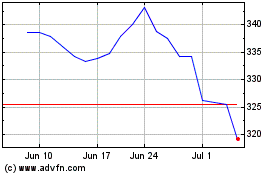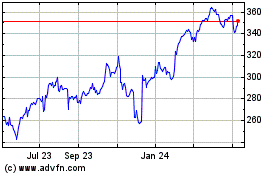Anthem Countersues After Cigna Ends Deal -- WSJ
February 16 2017 - 3:02AM
Dow Jones News
By Anna Wilde Mathews
Anthem Inc. responded to a suit by Cigna Corp. with its own suit
against its merger partner, escalating the hostilities between the
two health insurers in the wake of a judge's decision that their
$48 billion deal violated antitrust law.
In its suit, filed like Cigna's in the Delaware Court of
Chancery, Anthem said it sought a temporary restraining order to
block Cigna from ending their pact. It also sought to force Cigna
to adhere to the terms of their deal and requested damages. Anthem
said it was reacting to "Cigna's campaign to sabotage the merger
and to try to deflect attention from its repeated willful breaches
of the merger agreement."
Anthem's move is a fast response to Cigna's announcement Tuesday
that it was terminating their agreement and pursuing litigation
seeking a $1.85 billion breakup fee plus more than $13 billion in
damages from its deal partner. Cigna had said that Anthem violated
the terms of their agreement, and that its strategy had led to the
rejection of the deal.
Anthem argued Cigna doesn't have the right to end their
agreement, which it said it has extended to April 30.
The twin suits come after months of growing discord between the
two companies, which had originally announced they would combine in
2015 amid an industry merger frenzy. Both had previously accused
the other of breaches of their agreement.
Last week, U.S. District Judge Amy Berman Jackson blocked their
combination on antitrust grounds, saying it would create an
unacceptable reduction in the number of companies able to serve
large multistate employers that insure their workers.
The decision followed a similar one by a different judge
regarding the $34 billion acquisition of Humana Inc. by Aetna Inc.
Those two health insurers said Tuesday they were calling it quits,
jointly agreeing to end their merger. That, combined with Cigna's
announcement that it wanted out of its Anthem pact, all but quashed
a deal boom that would have reshaped the industry and marked a
triumph for the Obama administration's antitrust enforcers, which
sued to halt both deals last July.
Anthem is appealing the judge's antitrust ruling against its
acquisition, an effort that faces an uphill battle. Even if it is
able to keep Cigna in the fold until the end of April, that is
almost certainly not enough time to clear the various legal and
regulatory hurdles the insurer must overcome to complete a
deal.
Cigna said Tuesday that the merger "cannot and will not achieve
regulatory approval" and that "terminating the agreement is in the
best interest of Cigna's shareholders."
But Anthem said Wednesday that it "believes that there is still
sufficient time and a viable path forward potentially to complete
the transaction" and it is "committed to completing this
value-creating merger either through a successful appeal or through
settlement with the new leadership at the Department of
Justice."
Merging parties don't often appeal adverse court rulings because
of the time, money and uncertainty involved in trying to keep a
deal together during prolonged litigation. It could be weeks or
months before a new Trump administration Justice Department
antitrust team is fully in place. Even if such talks did unfold,
Anthem would have to overcome the court ruling that says
unequivocally the deal violates federal antitrust law.
Tim Greaney, a professor at Saint Louis University School of
Law, said that Anthem's appeal was very unlikely to be resolved
before the end of April. "I don't see how that could be done," he
said, because even if an appeals court disagreed with the antitrust
decision, it would likely remand the matter back to Judge
Jackson.
In her ruling, Judge Jackson called the rift between the two
partners "the elephant in the courtroom." Analysts have long said
litigation between the two appeared likely if a judge blocked their
merger. For months, the two companies waged battles over strategy,
direction and leadership that have become increasingly public.
During antitrust trial proceedings that began in November,
Anthem mounted a legal defense of the merger single-handedly. Cigna
lawyers said very little during the proceedings, and when they did,
it usually didn't help Anthem's position.
In its statement Wednesday, Anthem offered a detailed timeline
of what it said were Cigna's actions that had led to the rejection
of their combination, going back to their efforts to win Justice
Department approval. During the antitrust trial, Anthem had sought
to minimize differences between the two companies, as it argued
that they could still successfully forge a unified insurer.
For its part, Cigna said Tuesday that Anthem had breached their
agreement by not using its "reasonable best efforts" to win
regulatory approval for the deal.
Write to Anna Wilde Mathews at anna.mathews@wsj.com
(END) Dow Jones Newswires
February 16, 2017 02:47 ET (07:47 GMT)
Copyright (c) 2017 Dow Jones & Company, Inc.
Cigna (NYSE:CI)
Historical Stock Chart
From Mar 2024 to Apr 2024

Cigna (NYSE:CI)
Historical Stock Chart
From Apr 2023 to Apr 2024
